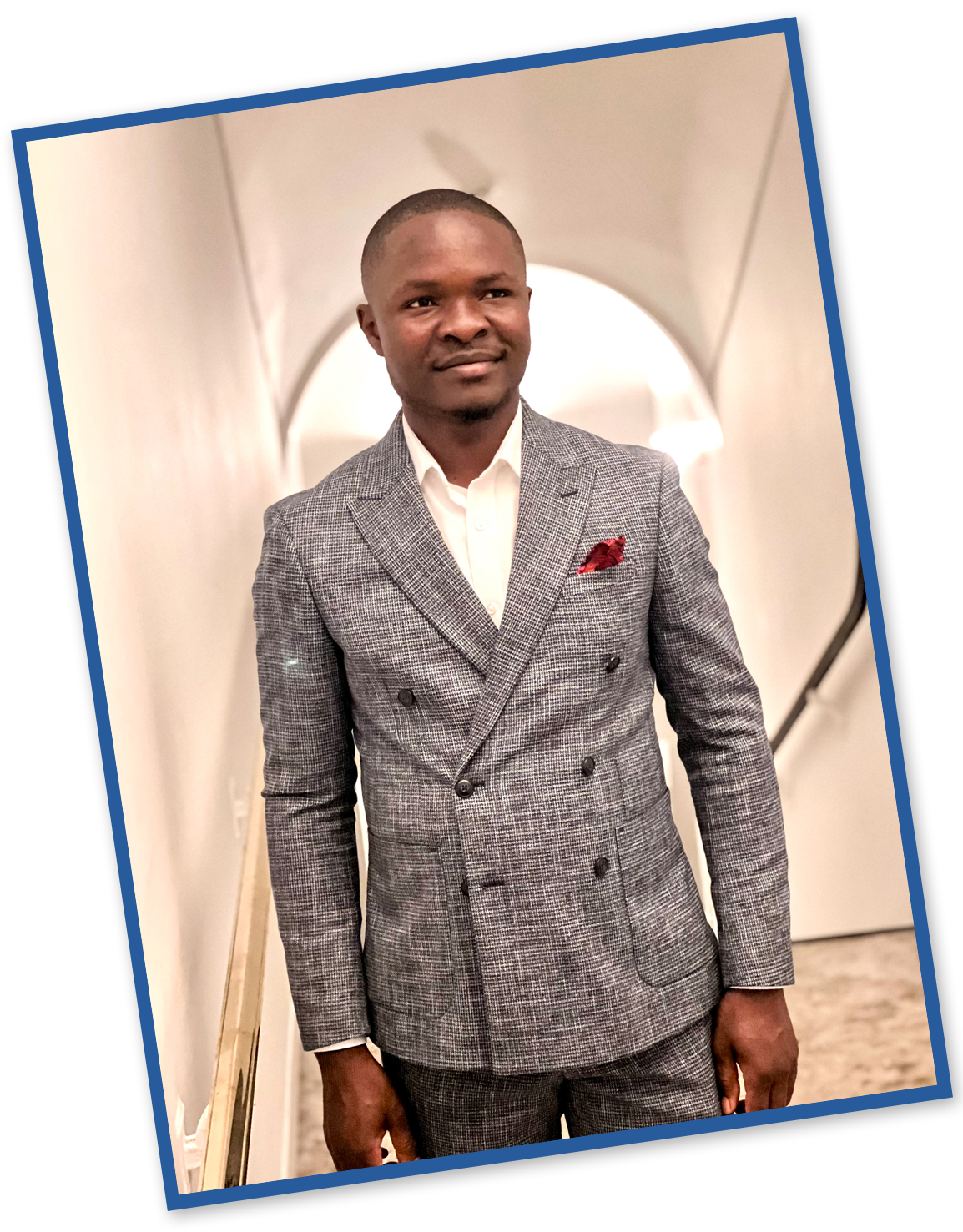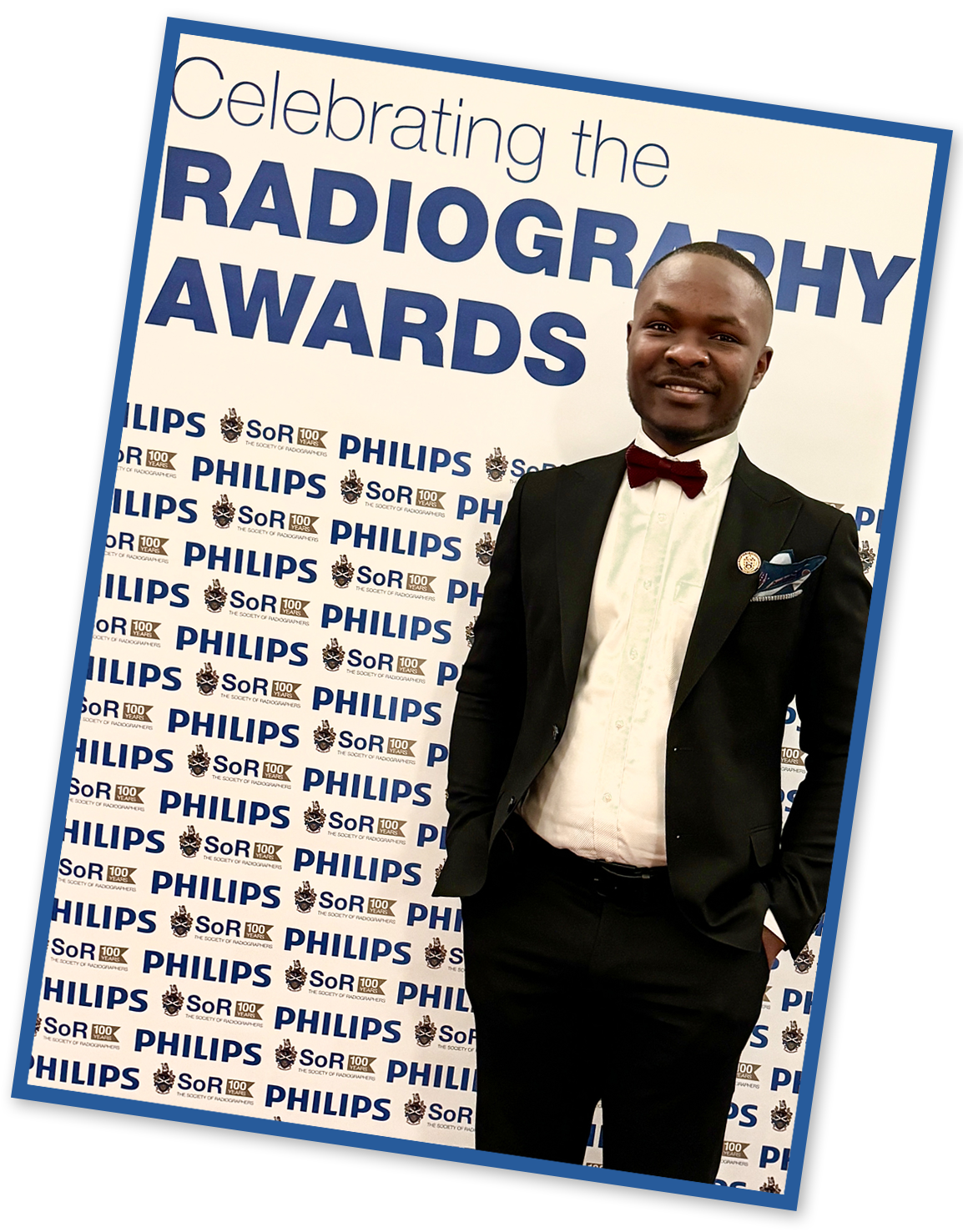Q&A with UK Council rep Nnaemeka Ugwu: ‘Membership is sacrosanct’
Diagnostic Radiographer Nnaemeka was elected to the SoR’s UK Council earlier this year as representative for the northern region. Synergy chatted with him about his passion for service and what makes the Society unique
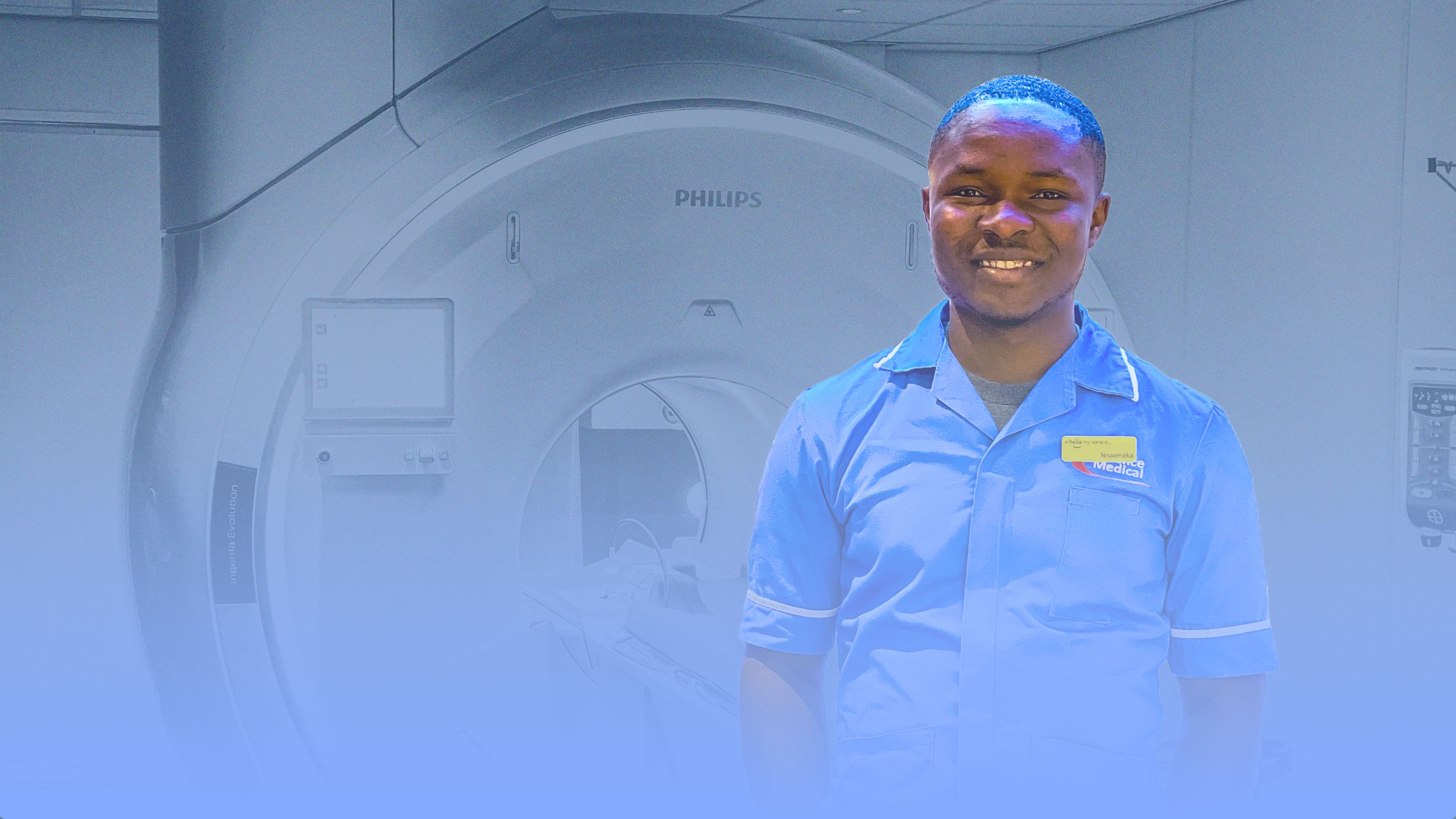
When Nnaemeka Ugwu declared his candidacy for UK Council as representative for the northern region, all he hoped for was an opportunity to give back to the SoR and the members who had helped him get where he is today.
After studying at the University of Nigeria from 2011 until 2016, then working in Lagos, Nnaemeka officially came to the UK to work in 2019. The transition wasn’t easy, and not just because of the culture shock. Nnaemeka’s move brought him to the UK just as the pandemic kicked in, and he found himself dropped in at the deep end.
But, he says, with the help of his fellow radiographers, his employer Alliance Medical, and the SoR, he has been able to navigate the change and work across a number of hospitals, develop his career and take up a role as MRI clinical lead.
Thanks to that journey, Nnaemeka has gone from strength to strength – which is why he decided to run for UK Council representative for the northern region, a part of the country he fell in love with during his time here.
Since his transition, Nnaemeka has worked as a mobile senior MRI and CT radiographer all over England. As of last year, Nnaemeka serves as MRI clinical lead at South Tyneside Integrated Diagnostic Centre for private healthcare firm Alliance Medical. Alongside his clinical positions, Nnaemeka has worked as a personal development mentor with the Consortium for Advancement of MRI Education and Research in Africa (CAMERA) MRI Africa, a leading advocate for MRI in Africa and a global network of MRI experts created in October 2019.
Nnaemeka helped CAMERA advance access to high-value MRI across the continent by providing mentorship to professional colleagues across different countries in the region, training, networking and research capacity building.
He also served as an observer for the SoR’s UK Council, sitting in on council meetings to observe the process of decision-making, while moving motions and sharing experiences, which helped serve as a basis for improving clinical outcomes. Earlier this year, Nnaemeka was elected to the UK Council as representative for the northern region – a position that he hopes will allow him to address the overarching regional issues, drive membership engagement and promote fair working conditions and learning opportunities.
Synergy caught up with Nnaemeka to find out more about his plans and his experiences, and his perspective on how to help members make the most of the SoR.
Could you tell us a little about yourself and the work you do?

I am the MRI clinical lead at Alliance Medical, where I work at South Tyneside & Sunderland Integrated Diagnostic Centre (IDC) South Shields.
I’ve worked with Alliance for more than five years now. I started with mobile duties, working across different NHS hospitals in England. Around two years ago, the Integrated Diagnostic Centre was opened in a partnership between South Tyneside and Alliance Medical. I joined them just over a year ago.
What was your journey into radiography like?

My journey into the profession stems from inspiration from my dad, who was a chemistry teacher in secondary school. I developed an interest in chemistry, how different chemical compounds react and interact, when I was very little.
That interest pushed me to study further, and I remember in one of my school textbooks I saw a man dressed in a lead apron. I asked my dad, and he explained that the apron is used to protect radiation workers from radiation exposure. It was the first time I had heard about radiation workers – and out of curiosity I started researching. I found out about the different areas of radiography, diagnostic, therapeutic, industrial radiography; I developed a real passion for the subject, and so I went to study at the University of Nigeria. When I finished, I worked in Lagos for a couple of years, and developed my interest in cross-sectional imaging. Eventually, I proceeded to my postgraduate diploma in MRI.
In 2019 I got a job with Alliance Medical in the UK. I’d registered with the Health and Care Professions Council, applied and got the job – right before Covid. When I came in, it was tough.
All of the cultural shock happened. I wasn’t even sure how to drive in the UK; I didn’t realise they drove on the other side of the road! I had support from an instructor and friends who helped me navigate that pathway, and then Covid happened.
I lived in Essex at the time, and worked in a lot of hospitals within that region. I worked in Maidstone, West Middlesex, King’s College, St Mary’s, all around that area, and then after Covid I moved to the Midlands. I worked in a lot of hospitals in the Midlands, and ended up travelling further north. That’s how my interest in the region developed. I really enjoyed going up there to South Tyneside – people are nice everywhere, but the north is special.
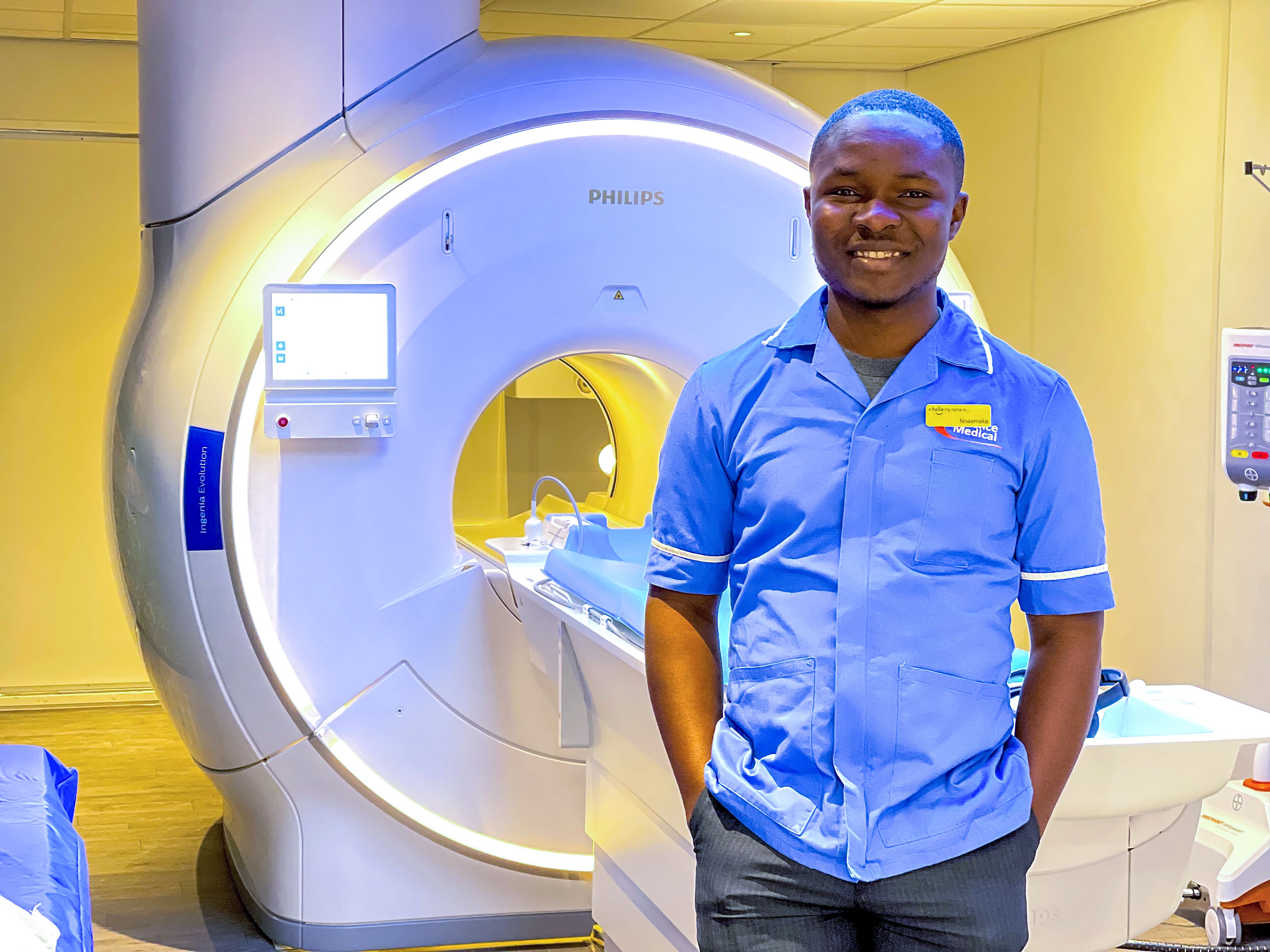
What made you decide to stand for election as northern region representative on the UK Council?

While I was in school, I used to be student president. I really enjoyed the position – rendering service, solving people’s problems. It gave me joy seeing I could be of help to other people. When I came to the UK, I received help, so I thought about what I could do to give back, and the best way to contribute to my profession was through the society.
It all stems from my passion for service. Before I became council rep for the north, I was elected to be a council observer at the Annual Delegates Conference, just over two years ago. I did that for a year alongside my colleague, and during that time I developed an interest in understanding how the SoR works. Being a council observer gave me insight into the SoR at that level, and I thought – why not? I could represent my region some day.
When I found out the results, I felt really humbled. Before all the announcements came out, we were expected to have people who could provide references for us, so I had people from the north who were happy for me to represent them, who provided those references for me. Some of them were reps, some were members – I just felt so humbled because I was unopposed. Any one of them could have stepped forward to compete with me.
Now that you’ve been elected, what are your next steps?

I’ve taken some time now to really engage with the members, and I’ve received a lot of support from the regional officer Helen Wickham. She has been doing a great job, helping with networking events to bring the reps and managers together.
We’ve tried to provide solutions to a few of the issues in the region, and those events have proven really helpful for that. I want to provide the support that the region needs.
What are the issues that exist? How are we going to tackle those issues? What are the members expecting? What do they want from us? That’s where we are at the moment – trying to talk around these issues. We’re looking at membership engagement at the moment; trying to understand why we have members leaving the society, and if it’s because of something we need to be doing. Retention is something I’m really passionate about in the region, because we aren’t as big as some of the other regions in the country. There aren’t a lot of hospitals in the north, hence member retention is sacrosanct.
I’m also keen to promote fair working conditions, not just for members in the north but also from a national standpoint. The other aspect of that is the promotion of learning opportunities. There are countless member benefits, but creating awareness around these benefits will be very helpful, because members aren’t taking full advantage of these benefits. If we don’t present these opportunities to members, how are they going to know?
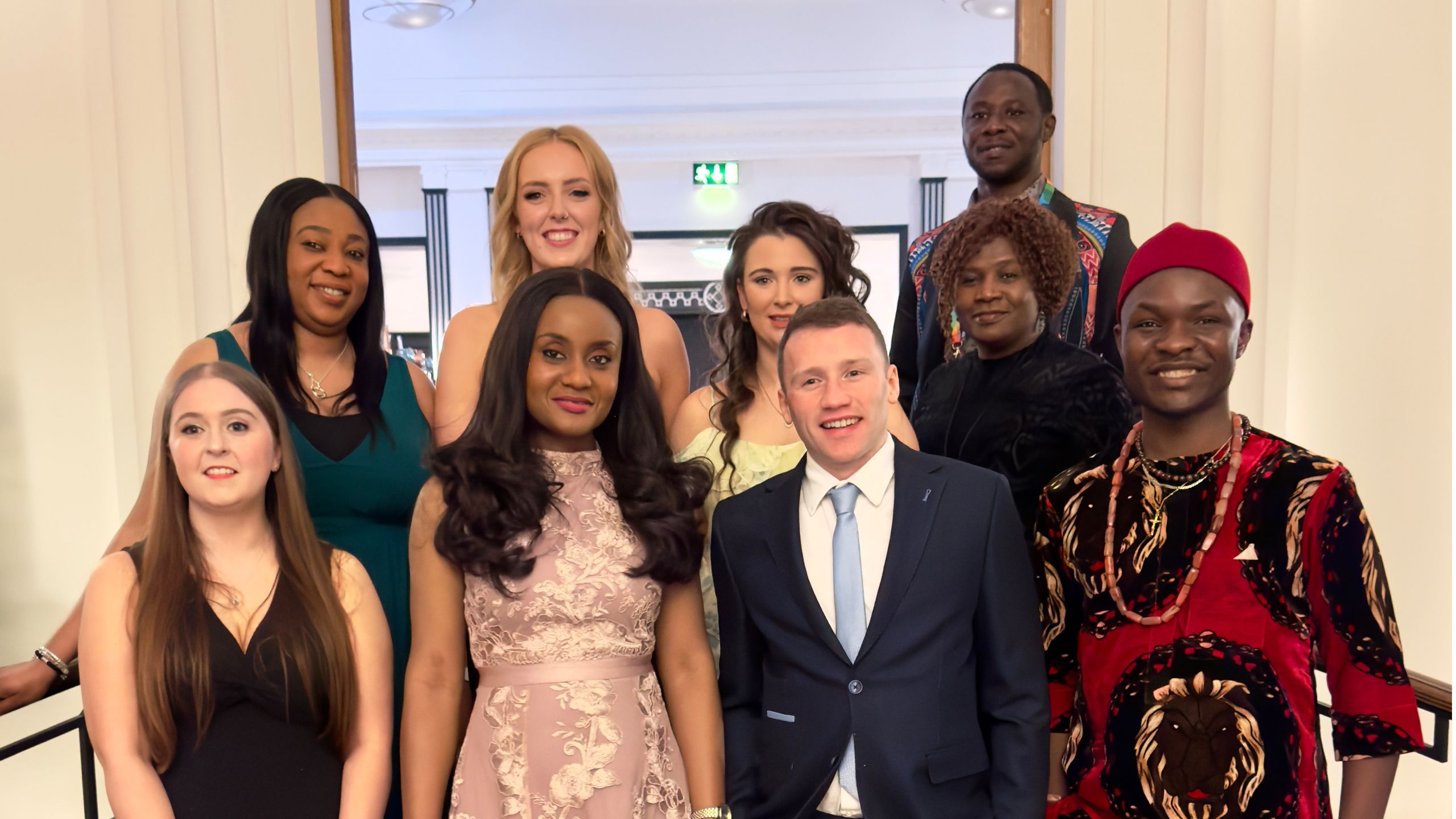
Nnaemeka Ugwu (front right) at the SoR Annual Delegates Conference with other delegates
Nnaemeka Ugwu (front right) at the SoR Annual Delegates Conference with other delegates
Can you tell us more about your time as a council observer? Has that helped you in your duties as a representative?

When I was an observer, were were invited to observe when the Council had meetings. It wasn’t like we had voting rights! I got to see how they debated topics, how decisions are made at the council level and how policies are made.
For me, it was a real learning opportunity – not just about the Council, but for how motions are generated and vetted by the Delegates Conference Committee (DCC) before being presented, how membership fees are decided and what those fees are being used for.
We then presented a formal report to members during the subsequent Annual Delegates Conference.
Any member of the SoR can be an observer. If you are interested, you have to indicate an interest to your ADC lead, present a manifesto and share your plans if elected, and finally undergo an election process. It's a good place to start if you have an interest in what happens at the Council.
Are there any messages you want to pass on to the membership?

I would like to give a word of encouragement to members. A lot of members are struggling with problems in their professional lives, and they don’t know who to go to – but this is why we’re here. If a member is struggling, they can reach out. As a member, you should benefit from your membership. The SoR is there for you in times of need, and when that need arises you should know who to talk to. There are SoR reps in your hospitals, and its easy to find out who they are. If you do not have reps in your hospital, you could become one by expressing your interest. You don’t need to isolate yourself. If you are interested in getting involved in the society, you will be supported.
The SoR is a fantastic union to be a part of. You will receive all the support and assistance you need as a radiographer to function effectively in your workplace.
More about the SoR UK Council
The SoR UK Council is the board of directors and the governing executive committee for all the society’s activities. Members of the council are elected from the membership by other members on a regional basis.
Elected council members will have a range of duties, including: representing and promoting agreed policies; representing the trade union and professional interests of all society members; developing and promoting the advancement of the radiography profession and the wider radiographic workforce; undertaking campaign work as required; encouraging recruitment of members in the countries and region(s); and attending and speaking at national and international conferences, events and meetings.
Find out more about the UK Council and elections online here.
Read more



